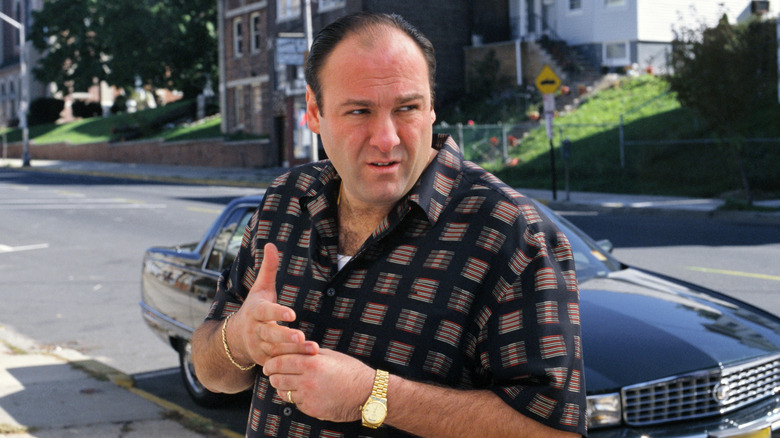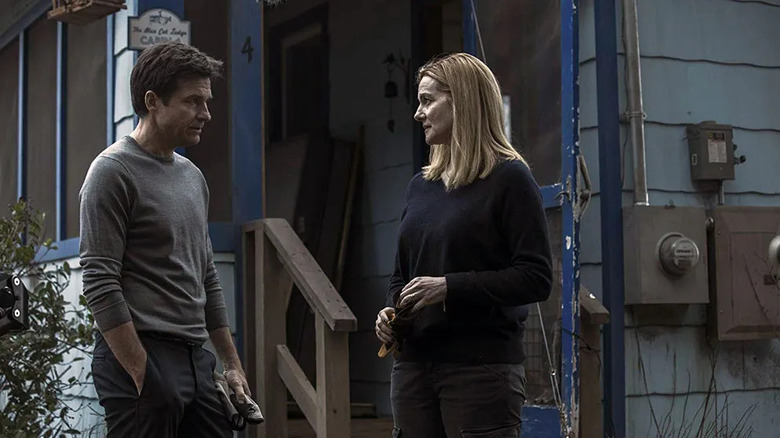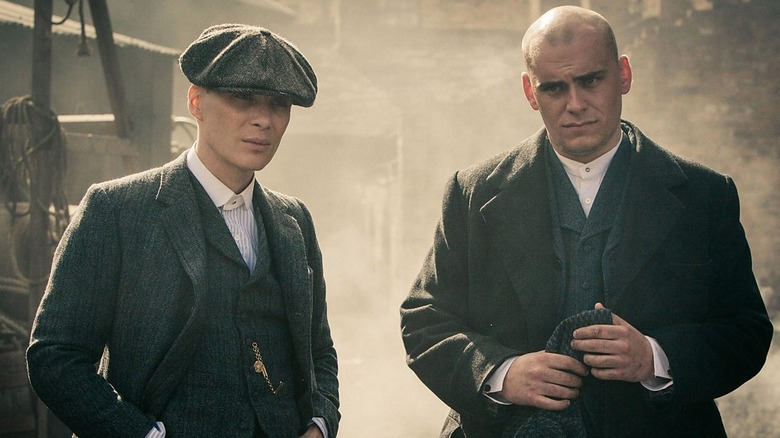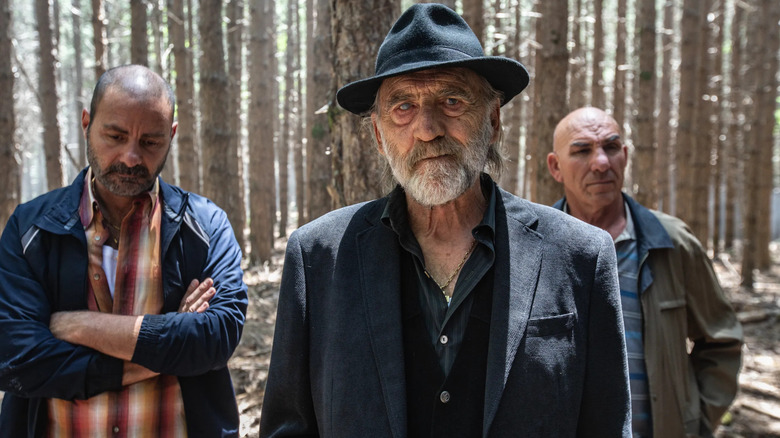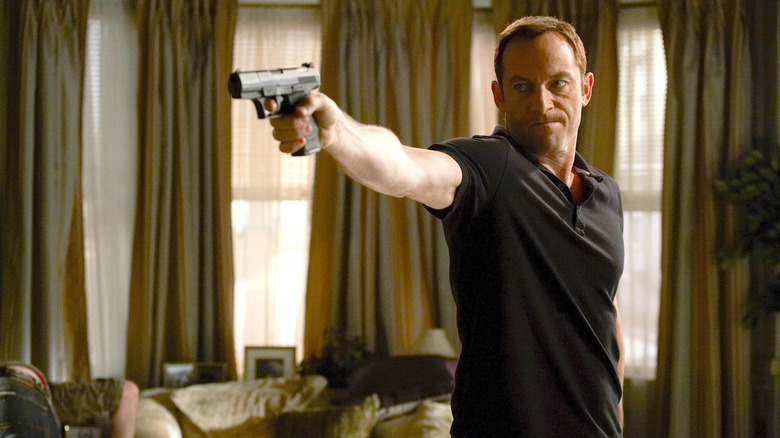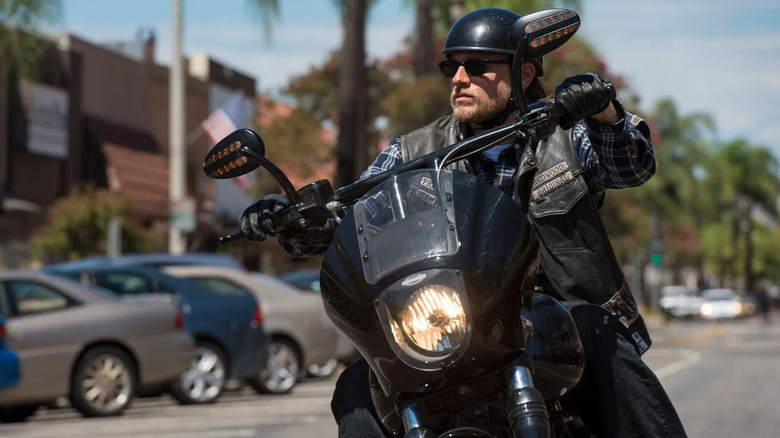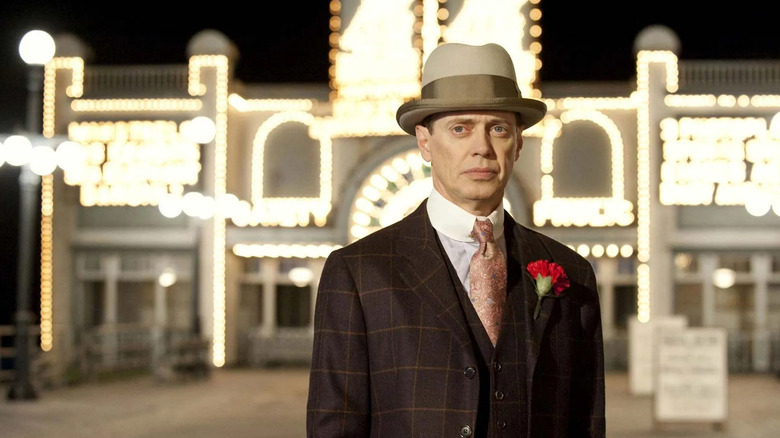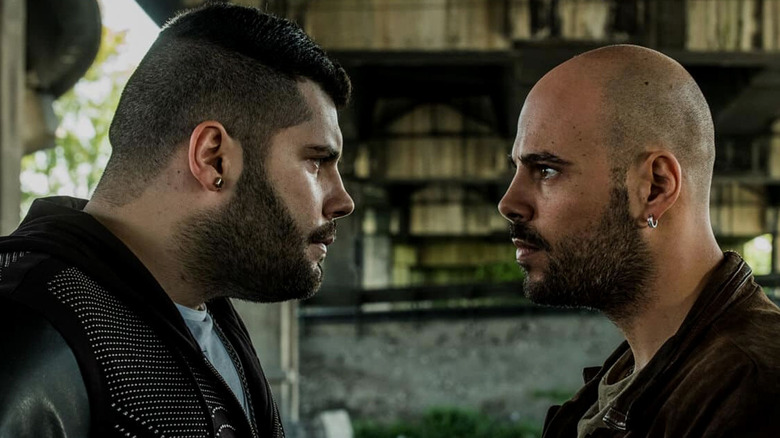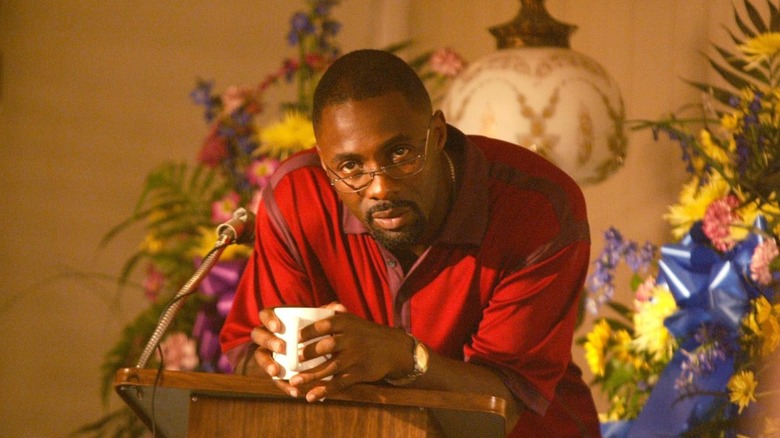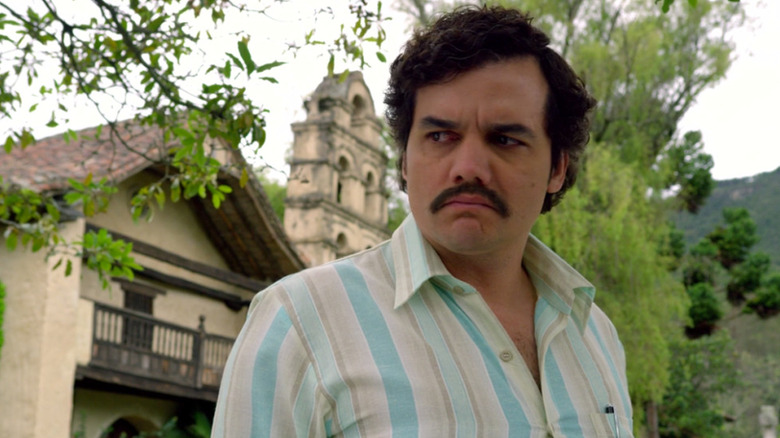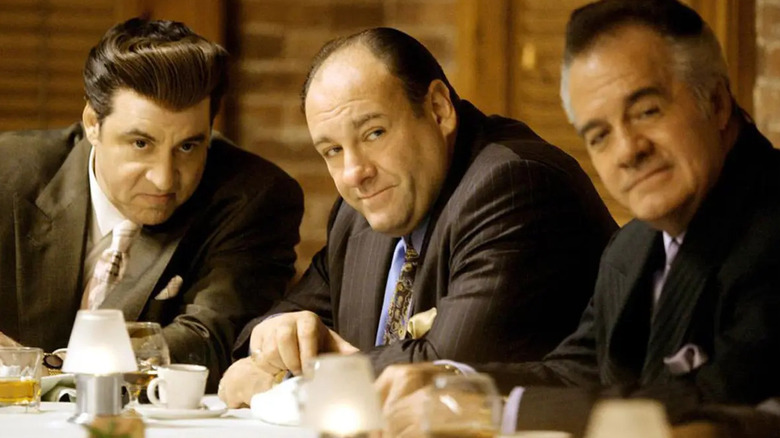The 10 Best Mafia & Gangster TV Shows Ranked
Since the late '90s and early 2000s, fictional stories about organized crime have been some of the most popular, intriguing, and enticing programs on television. Ever since David Chase reinvented the genre with "The Sopranos," there's been no shortage of savvy and merciless gangsters to choose from on the small screen. Why is that? Well, without getting into an elaborate study and thorough analysis of the human psyche, let's just say there's an inherent appeal and thrill in watching extended stories about dangerous, unpredictable, and violent figures who never stand down when it comes to achieving their goals.
Mafia-type crime syndicates have rules, structures, and a hierarchy unlike anything else, so they naturally pique the interest of the common person. We fear mobsters just as much as we're captivated by them because they follow a delicate and often arbitrary moral code that allows them to do abhorrent things that we would be incapable of executing. They're often extremely intelligent psychopaths with uncanny confidence and fierce determination, able to walk through hell if they need to and kill without hesitation in order to survive or conquer. They elicit respect and practice terror through intimidation and control, all for a luxurious life that's marred by the need to constantly look over one's shoulder.
Here, we gather 10 of the best and most engrossing mafia and gangster shows that television has to offer.
10. Ozark
Although Bill Dubuque and Mark Williams' "Ozark" was far from being the first of its kind, the reason the Netflix series is on this list instead of its far better thematic predecessor "Breaking Bad" is that it's more gangster than it appears on a first impression. The series excellently portrays how a perfectly ordinary middle-class family can become associated with the Mexican criminal world through force instead of by choice.
Marty (Jason Bateman) and Wendy Byrde (Laura Linney), alongside their two teen children, Charlotte (Sofia Hublitz) and Jonah (Skylar Gaertner), find themselves in the grasp of a menacing Mexican drug cartel through no fault of their own. Well, that's only half-true ... it's complicated. The bottom line is that Marty has to utilize every bit of his knowledge and shady skills as a finance advisor to launder the cartel's money so his family doesn't end up another casualty in the drug trade business. To do that, he needs to move them to Osage Beach, Missouri, entirely upending their cozy and comfortable life in Chicago — a move that comes with the admission of some hard truths. Naturally, this requires the involvement of some local small-time redneck criminals and the Kansas City mob.
What "Ozark" does phenomenally well is highlight why you can't just become a mobster overnight, no matter how deep you get into the circles of some real stone-cold killers. You'll always be an outsider with much more to lose, which is illustrated as the Byrdes (every single one of them) inevitably become entangled in a drug war between the cartel and the FBI, along with other smaller fish in a pond that's filled with sharks and piranhas. Though "Ozark" ended on a quite divisive finale, it's worth watching every minute if you're a fan of the genre.
9. Peaky Blinders
"Peaky Blinders," Steven Knight's historical drama, is crisp with a filthy, gritty milieu, showcasing various street gangs who rule nearly every corner of England's seedy Birmingham. Set in the early nineteenth century, right after the First World War, the show is a stylish celebration of cunning hoodlums. The series' antihero lead is Tommy Shelby (played by an overbearingly astonishing Cillian Murphy), who guides his family (and gang) from being small-time criminals to powerful and respected rulers of the city.
There's a poetic dirtiness about Knight's show that's both raw and appealing as it combines old-fashioned mafia tropes with personal traumas. It's no wonder it's become a banger with both critics and audiences during its six-season run. "Peaky Blinders" is far from flawless when it comes to delivering nuanced narrative and in-depth characterization — sometimes the writing bites off more than it can chew — but it's hard to deny how electric the series is when it finds the right balance and tone. That same somber, harsh, and extremely ferocious tone drives its protagonist beyond the limits of his own corrupted mind and challenging circumstances to emerge triumphant. All that's to say, if you're looking for a show where criminals don flat caps like kings in a world that smells of whiskey, smoke, piss, and testosterone, "Peaky Blinders" might be right up your alley.
8. ZeroZeroZero
Stefano Sollima's 2020 miniseries, "ZeroZeroZero," may fall more on the side of underrated/underseen gangster shows, but don't let that fool you about its importance and super-realistic portrayal of organized crime. Based on Italian author and journalist Robert Saviano's — who singlehandedly exposed the inner workings of the Camorra through his work by putting his own life at a constant risk — non-fiction book of the same name, the series follows the transportation of a large cocaine shipment from the hands of a Mexican drug cartel to the powerful senior boss of the 'Ndrangheta in Italy, with a family of American brokers acting as the handlers during the journey.
By showing all three sides in meticulous detail on separate continents, we get to witness how such a deal is executed by people in high positions, revealing systemic corruption, power imbalances, and the complicated ways organized crime works with high-level efficiency behind the scenes. Thanks to a multicultural cast led by Andrea Riseborough, Dane DeHaan, and Gabriel Byrne — among other fantastic European and Hispanic actors — "ZeroZeroZero" impresses as an epic collaboration of talents from various countries. It feels vast, threatening, and frighteningly real — just like any show that aims to depict real gangsters across the globe should.
7. Brotherhood
Blake Master's "Brotherhood" aired at a time (2006-2008) when it stood little chance to truly stand out in the murderer's row of Peak TV giants. Any series airing during the tail end of "The Sopranos" and the last years of "The Wire" had scarce opportunity to shine the brightest in that era. Thanks to its more traditional concept and a lesser-known but still outstanding cast of performers, "Brotherhood" just didn't (and couldn't) get its fair due in the mid-aughts. Yet its premise is original and quintessential in many ways, especially with how it conveys the American dream and a blue-collar, working-class community through different viewpoints. It's a classic gangster trope that we've seen in many movies, but rarely on the small screen, especially to such an extent.
The plot follows Irish-American brothers Tommy (Jason Clarke) and Michael Caffee (Jason Isaacs) as the two stand at the polar ends of their local community in Providence, Rhode Island. The former is a state politician with hard-earned honor and an honest, justice-seeking moral code, while the latter is a prominent and formidable crime figure in the city's Irish mob. Their values and ambitions clash straight away, yet they both represent the importance of their roots and family through their own distinctive worldviews. They're clearly the spectacles that bring a red-hot intensity to the story, but it's thanks to all the supporting characters that "Brotherhood" feels so multifaceted and cultural in a unique setting. It's brutal, grim, and dramatic as hell — a mix of characteristics that often define the best shows about mobsters and their families.
6. Sons of Anarchy
If we're talking about small-screen gangs, it's imperative that Kurt Sutter's "Sons of Anarchy" is included. Before the 7-season-long show came around, there was nothing like it on the small screen. Sutter created an original television milieu by capturing a brotherhood of bikers who slowly turned into vicious, if genuinely relatable, outlaws and murderers, ruling their small fictional town of Charming in San Joaquin, California. Led by Jax Teller (the role that established Charlie Hunnam's career) and Clay Morrow (Ron Perlman), SAMCRO delivered the subculture of a motorcycle club into our homes in lush detail. Fascinating, intimate, and badass at the same time, the FX series grabbed hold of the zeitgeist of the late 2000s and early 2010s with firm hands.
An admittedly Shakespearean take on a group of outlaws who lived by their own (often twisted) moral codex, "Sons of Anarchy" was replete with violence, breathtaking twists, and unexpected character deaths that were sometimes just as touching as they were gory. Even though the show went on a little too long and suffered because of it (Sutter was hesitant about killing his darlings) in its final season, it can't be understated how revolutionary the series felt during this era of television. You just simply can't forget that last ride with Jax as he drives towards his tragic fate while The White Buffalo & The Forest Rangers' ballad, "Come Join the Murder," plays in the background and tears your heart to pieces.
5. Boardwalk Empire
Created by famed and accomplished "The Sopranos" writer Terence Winter, HBO's "Boardwalk Empire" tackled the Prohibition era with rich period detail, a prestigious cast, and remarkable writing. The plot follows Nucky Thompson (Steve Buscemi), an intelligent and dangerous politician in Atlantic City, New Jersey, as he navigates the city's underworld alongside its powerful political elite while he leads a sumptuous and glamorized lifestyle. Filled with famous historical figures such as Al Capone (Stephen Graham), Lucky Luciano (Vincent Piazza), and Arnold Rothstein (Michael Stuhlbarg), among many others, Winter's series recreated a time with all of its intricate machinations both in politics and organized crime with crucial authenticity and a lived-in atmosphere.
Drowning in liquor, cigarette smoke, and blood, "Boardwalk Empire" is as classic a mafia show as it gets. Thus, it's little surprise that the series won 20 Primetime Emmys between 2010 and 2014. Perhaps it's not the easiest and most viewer-friendly program to get into as far as crime dramas go, but it's certainly one that deserves all the attention and praise that went its way during its run and ever since.
4. Gomorrah
This series is the best fictional TV drama ever made about the Camorra and modern organized crime in Italy. Created by the aforementioned "ZeroZeroZero" author Robert Saviano — and loosely based on his non-fiction bestseller of the same name — "Gomorrah" portrays the inner workings of the Savastano clan in Naples, delivering a raw, merciless, and chillingly realistic depiction of how mafiosos operate in modern-day Italy. Throughout the series, we follow Ciro Di Marzio (Marco D'Amore), a loyal and savvy soldier of the Camorra, and the Savastano family, who rule the Secondigliano suburb and half of Naples until their reign is threatened by rival gangs and one of their own people.
Drawing from real-life mafia bosses and events, "Gomorrah" is the antidote to famously romanticized gangsters. With its docu-style cinematography, intricate plotlines, and ruthless antiheroes — who come across more like perilous people snatched from real life than fictional characters written for the screen — the show is as realistic as it gets. "Gomorrah's" world is ugly and corrupt to its last corner, filled with rampant violence, appalling gore, and heart-breaking tragedies that will shake you to your core regardless of how much you know about the Camorra. Thanks to its outstanding and dedicated cast of Italian actors, sharp writing, and beautifully haunting score, the series has rightfully earned its spot in the pantheon of some of the best gangster dramas that ever graced the television screen. It's mandatory viewing for everyone who's into great epics that aim to deconstruct the hierarchies of the Italian mafia.
3. The Wire
It's hard to say anything new about creator, author, and former police reporter David Simon's masterpiece that hasn't been said already. "The Wire" is a slow and thorough examination of the drug scene, law enforcement, and politics in Baltimore, Maryland. Simon's series set out to deliver the best and most accurate depictions of the local police and the drug kingpins who run the city's underworld; undoubtedly, the series fulfills that goal completely, with not much left to be desired. Along the way, it introduced the world to characters like Omar Little (Michael Kenneth Williams), Stringer Bell (Idris Elba), and Detective McNulty (Dominic West), all of whom have become iconic TV figures since the show's run between 2002 and 2008.
"The Wire" is arguably a near-perfect show that tackles extremely delicate subjects and themes like drug dealing, addiction, corruption, the American justice system, and other sensitive yet omnipresent social issues within a wide variety of communities. Despite all the praise about the series' brilliance, however, it never won a major award during its run and was only nominated for two Primetime Emmys, in 2005 and 2008. Despite this, it's unequivocally one of the most important and influential TV shows ever made.
2. Narcos
Indisputably, Pablo Escobar was one of the most infamous gangsters and drug cartel leaders that has ever lived. But to truthfully capture and portray why he was such a feared and diabolical yet respected figure in Colombia is a task that movies and TV shows failed to accomplish until Netflix's "Narcos" came around in 2015. Led by a mesmerizingly charismatic Wagner Moura as the Hispanic kingpin, the series managed to deliver an epic and thrilling telling of the rise and fall of Escobar, including how DEA agents Steve Murphy (Boyd Holbrook) and Javier Pena (Pedro Pascal) chased him from the late 1970s to his eventual death in 1993.
Creators Chris Brancato, Carlo Bernard, and Doug Miro didn't stop there; the series also covered what happened after Escobar's reign had come to an end and rival cartels rose to take his place in Seasons 3 and 4. Depicting the decades-long drug war between the USA and Colombia to such an extent was a triumph in multiple ways. In essence, "Narcos" established a cinematic and vigorously entertaining style on television that several similarly themed series have followed ever since. Now, it's practically impossible to talk about drug traffickers and Hispanic crime bosses on television without mentioning the show's influence and how it reinvented and revitalized the entire subgenre. Though "Narcos" wasn't exempt from criticisms that pointed out some of its historical inaccuracies — alongside its humanistic portrayals of mass murderers and sociopaths — it's easily one of the greatest programs of all time about organized crime and legendary mobsters.
1. The Sopranos
Tony Soprano is the pinnacle of American pop culture when it comes to mafiosos. There simply isn't another crime figure in television history that can be considered synonymous with his name, and David Chase's singular creation is still the most talked about crime show today. Though "The Sopranos" aired its final episode nearly two decades ago, its influence and greatness remain as relevant as ever. Tony Soprano (James Gandolfini's defining role) and his family (both work and personal) in the suburbs of New Jersey gave us complex and nuanced characters that we were immediately drawn to from the first time we saw them on screen.
The show celebrated Italian-American heritage, gave us insight into modern organized crime, and addressed so many delicate themes and social issues that it'd be almost impossible to name them all. It was a pioneering cable series that seriously and convincingly depicted therapy from different points of view, portrayed mobsters with all of their flaws and strengths, and, in essence, introduced the modern version of a fully-fledged antihero on the small screen.
Many of the entries on this list wouldn't have even been made without Chase creating a creative path for them to be born. "The Sopranos" was television nirvana at the right place and at the right time, which had to be recognized for its greatness. It won 21 Primetime Emmys and numerous other awards during its 6-season HBO run, but, more importantly, it left behind a legacy that will be studied for a very, very long time. The second Golden Age of Television began as soon as Tony walked into Dr. Melfi's office, and the rest is history.
